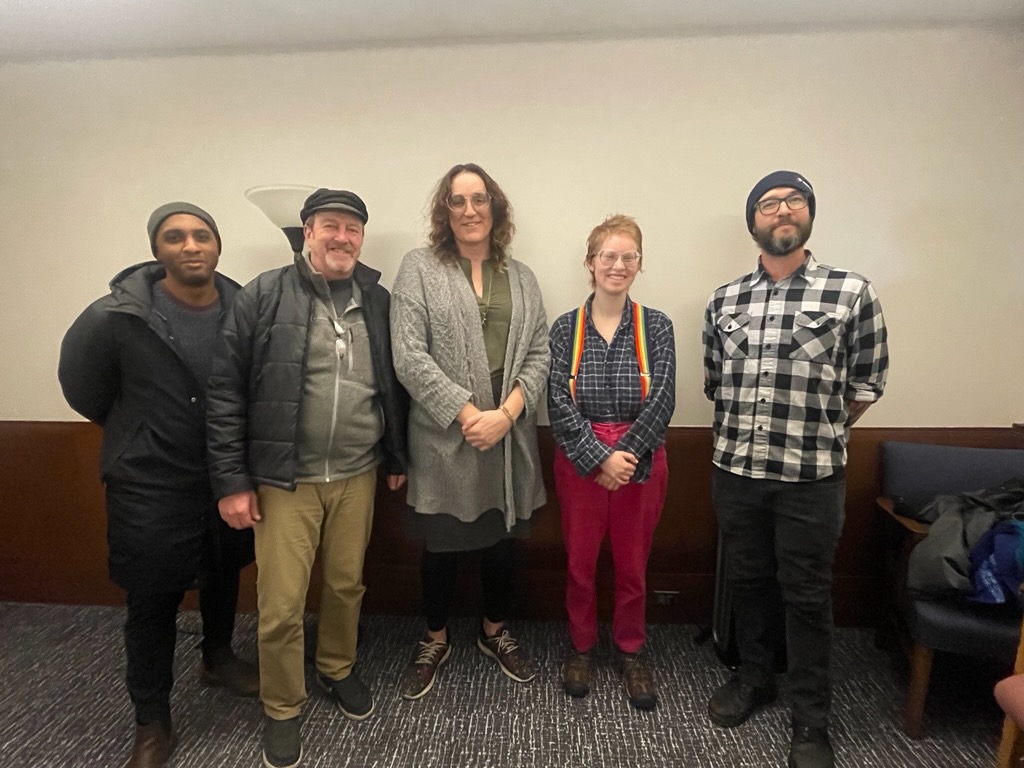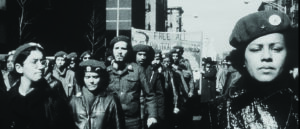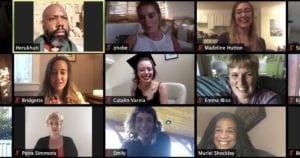
July 5, 2019
Creative practice for collective liberation
This is the beginning of a conversation
about how art could be
something different altogether.
The Situation:
These are times of rising fascism, ecological destruction, spiraling inequity, and a culture of collapse.
We need art, because the systems of conquest and oppression are so pervasive that the act of imagining different ways of being together requires cooperation beyond the limits of our reason.
We need to make and share stories songs, dances, and images that connect us with ancestors, with each other, with our own depths, and possible futures—art liberates.
But the artworld is also a market of luxury commodities, experience subsidized through elite institutions, enshrining concepts like “genius” and “the masterpiece.” Art is also a fortress where cultural hierarchies of patriarchy, racism, and imperialism are conserved, framed in gold and docile silence.
How can a BFA program at a college, situated within the systems of institutional artistic legitimacy actually work to dismantle those systems?
Defining Socially Engaged Art:
It is a term, that focuses on the function of art instead of its appearance. Pablo Helguera writes:
Socially engaged art functions by attaching itself to subjects and problems that normally belong to other disciplines, moving them temporarily into a space of ambiguity.[1]

This can happen in a gallery or while mopping the steps of a gallery.[2] It can happen in the museum when slave shackles are inserted into a display of 18th century fine metalworking,[3] when knitting circles meet to make “pussy hats” for a march, when comic books give voice to the squatters,[4] and when strangers are brought together for a shared meal.[5]
In the Black Arts Movement, the Guerilla Girls, Fluxus, funk, punk, graffiti, street theater, and a well-choreographed blockade: Art offers possibility models for different ways of being together.
About Goddard College
Goddard College was founded in 1938 in the hope that self-directed, democratic learning could prevent fascism. Since then it has fostered new modes of adult education and low-residency education and has been a haven for radical thinkers, creative innovators, and folks for whom the standard model of higher ed just doesn’t work.

Now entirely low-residency (which means students are on campus for a week each semester and do the rest of their work long distance, in dialogue with faculty advisors), Goddard offers a variety of BA, BFA, MA, and MFA degrees.
The BFA in Socially Engaged Art was launched in 2018, and we are currently seeking:
Printmakers, Dancers, Actors, Filmmakers, Composers, Environmentalists, New Media Artists, Singers, Sculptors, Cartoonists, Rappers, Anarchists, Jugglers, Game-makers, Choreographers, Curators, Educators, Poets, Set designers, Street Performers, Weavers, Activists, Acrobats, Painters, Musicians, Knitters, Photographers, Feminists, Designers, Puppeteers, Playwrights, Producers, Builders, Troublemakers, Clowns, Visionaries
We built this program to give you space to be who you are, to meet each other, and to work together, to support you in developing a unique studio practice to achieve projects you care about, to help you put your art in context, in terms of relevant theories of art, creativity, and social change, and to hold space for meaningful dialogue about how your work engages ethically with the groups it represents, impacts, and serves.
This is not the sort of BFA designed to teach you the correct way to draw, to act, to compose. We ask what you want your work to do, who your audience is, and how you want to serve them. Then we figure out what you need to work on every day to have the skills to do that well.
To do this, we need your help. So this is an earnest effort to reach out to artists seeking this conversation, this working environment, this comradeship.
We can make art differently.
We can make difference artistically.
Goddard College is a college, an accredited institution complicit in the economy of higher education. But this BFA does not seek to replicate the artworld; it seeks to infiltrate it—to provide you with access and support while you make work that disrupts, that resists, and that overturns.
[1] Pablo Helguera. Education for Socially Engaged Art. Jorge Pinto Books: New York. 2011. 5.
[2] Mierle Laderman Ukeles, Maintenance Art Tasks, 1973.
[3] Fred Wilson, Mining the Museum, 1992.
[4] Seth Tobocman, War in the Neighborhood, 2000.
[5] Rirkrit Tiravanija, Soup/No Soup, 2012.







